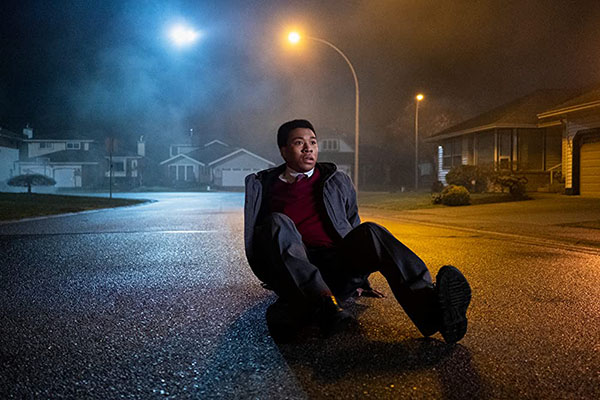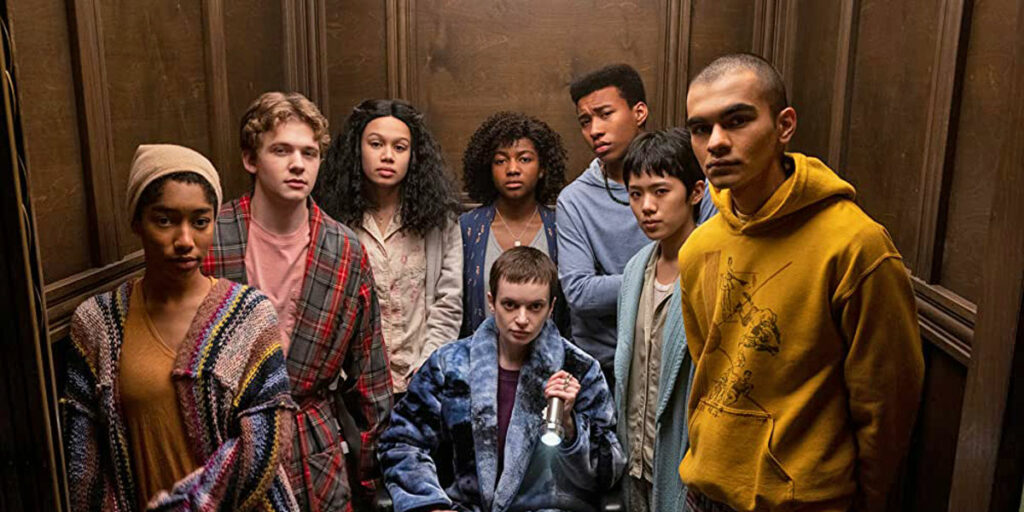The Midnight Club ’s few prominent merits are buried by poor management of time between its forgettable anthology tales and childishly “scary” overarching plot.
The Midnight Club is a new Netflix show, created by Mike Flanagan (the creator of Netflix’s miniseries The Haunting of Hill House, The Haunting of Bly Manor, and Midnight Mass) and Leah Fong, with Flanagan co-writing most of the ten episodes and directing the first two. Set in the Brightcliffe Home hospice, this series follows a group of eight terminally ill young adults, including cancer patients Ilonka (Iman Benson) and amputee Anya (Ruth Codd), lymphoma patient Sandra (Annarah Cymone), and AIDS patient Spencer (Chris Sumpter). The group have formed “The Midnight Club,” where they meet up every night to tell each other their own made-up stories. At the same time, Ilonka investigates former patient Julia Jayne, who mysteriously disappeared from Brightcliffe decades ago, only to return fully healed.
So yeah, The Midnight Club is essentially an anthology of shorter, self-contained stories tied together by an overarching narrative. But what surprised me is how close to evenly split the season’s time is between those two aspects. The stories that the Midnight Club themselves tell take up a little less than half of the season’s total running time, with the rest of it devoted to the main plot about Brightcliffe, its secrets, and the group themselves coping with their illnesses. And unfortunately, this divide is the biggest reason why, for me, The Midnight Club really doesn’t work. The main plot is just prominent enough to be the driving force of the show, but it’s sidelined enough for the shorter stories to come across as nothing more than distractions that needlessly pad out the total running time. These short stories usually have some thematic connection to at least one character, but they’re almost all so loose and not that poignant or clever, so they don’t really add anything to the show that justifies how much time is spent on them (which is usually 20-30 minutes).
It also doesn’t help that most of these stories on their own are either not that interesting or clash way too harshly with the rest of the series. The first story is nothing more than an annoying jump-scare fest. One of the later stories is a generic time-travel Terminator “homage” that’s resolved in such a long-winded, ridiculous manner. We get three segments across three different episodes devoted to a story about a serial killer that’s as basic and amateurishly scary as you can get, which has nothing to do with anything our characters are going through. Some stories, like an exaggerated old-school detective noir or an almost comedically campy sci-fi tale, feel like we’re suddenly watching a completely different show.
I could see such a stylistic change working if all the tales were the main focus of the series, but we’re more often than not watching a more serious tale about teens confronting their mortalities and uncovering dark secrets involving ghosts and rituals. Even the “serious” short stories are hard to take seriously because they have the main cast performing in all the roles, constantly keeping my emotional investment at an arms’ length because I’m reminded that what I’m seeing is just a story. The only two stories that I really liked are Anya’s because of how creepy and relevant to her it is, and Natsuki’s for its highly emotional, well-written payoff.

But even when we are focusing on the overarching story, that’s not done remarkably well either. The Midnight Club is being billed as a horror show, but 90% of its idea of horror is a series of almost cartoonishly silly zombies and shadow creatures, and constant, obnoxious jump-scares. Do not play a drinking game for every time the score blares a loud jolting sound at you, because you will die of alcohol poisoning. It’s outright laughable how many times the show thinks startling us with the same kinds of scares over and over and over constitutes horror or tension. The story doesn’t even capitalize on these scares half the time, making some of them come across as arbitrary or, at worst, insulting. I’m honestly shocked that Flanagan, who’s used jump-scares before but mostly does them well, allowed such childish tactics in his show.
The characters are mostly distinct and brought to life through strong performances, which are easily the best aspect of The Midnight Club. The standout is Ruth Codd as Anya, who has the best on-screen presence as well as the best material to work with. Everyone else has moments to shine, but they’re saddled with uneven writing that ranges from being some of the most touching dialogue I’ve heard in a while, to flimsy attempts at humor that sound like what a Gen Xer thinks teenagers sound like. Still, the group’s collective main story has some good to offer, with Ilonka sympathetically and tragically trying to find more and more extreme ways to avoid her looming fate and cheat a seemingly inevitable end. The ensuing conversations on how these “patients” view their struggles with their illnesses, how that’s altered their outlooks on life, and how they react to either their looming deaths or the current deaths of those around them, are generally effective on their own.
The relationships between various characters also grow and evolve in really heartfelt ways, with my personal favorite being the one between Sandra, a devout but all-loving Christian, and Spencer, who’s been ostracized from his own religious family after his AIDS diagnosis and initially resents Sandra’s faith. Anya also grows out of her cold exterior and becomes the heart and soul of most of the show. There’s a lot of great character work at play in The Midnight Club. The wind just keeps getting taken out of the sails by everything surrounding it. Other certain characters and relationships are also undercooked because the time that could have been spent on naturally developing them is instead spent on trying to have us understand them through those uninteresting short stories. A romance blooms between two characters, and I barely felt anything for it because I didn’t feel like I knew who either of them really were, despite an entire twenty-minute short story being used to try and get me to know them.
The subject of time management keeps popping up the more I talk about this show, because all of the problems really boil down to that in some way. The Midnight Club attempts to have its cake and eat it too with its half-anthology, half-singular-story approach. But in execution, this leaves us with what feels like two different shows fighting for control of one another and eating up each other’s time. And that’s not even considering the problems they have on their own. The show discusses how to make the most of the time we have on this Earth. But the only way it made me think about that was when I ended up regretting spending over nine hours of my own life on what’s left me with nothing but a bitter taste and a sense of bewilderment that Mike Flanagan, one of my favorite people working in movies and television right now, had his name anywhere near this.
The Midnight Club is a huge mess in story and tone that I really can’t recommend unless you’re fine with the most basic, cheapest scares and can roll with whatever genre shift gets thrown at you… and if you’re willing to have many plot details go unanswered because of how this isn’t a miniseries, but rather a planned multi-season show that doesn’t even have its second season confirmed yet. It already bothers me when a television season lacks closure without another season being already greenlit, let alone if the first impression is as terrible as this one’s. I personally have no interest in watching the second season of The Midnight Club if it ever happens, but if any viewer does decide to stick around for more, I hope they’re treated to a better time than I was.
The Midnight Club is now streaming globally on Netflix. Read our list of Mike Flanagan’s Netflix horror series ranked from worst to best!

